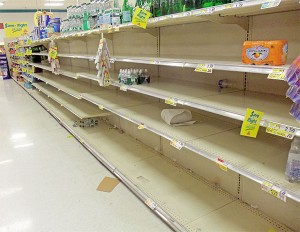Hurricane Preparation Tips & Checklist

Hurricane's often devastate the East Coast and they seem to be getting bigger and bigger! Should you evacuate or stay? Simply put, if you are in the path of a hurricane, you are not safe. If there is a mandatory evacuation in place, hit the road!
Even the most sturdy of homes can be damaged or destroyed. It simply isn't worth risking your life. Any number of things can go wrong and hurricanes are among the most destructive natural disasters. There are neighborhoods in Wilmington, NC that had never experienced flooding prior to Hurricane Florence and a vast majority of the residents had opted out of flood insurance. They all lost their investment in those homes but that isn't the point. The point is that you never know what could happen. There are so many dangers, lightning, tornadoes, flooding, flying debri and the list goes on. Your house could be sitting in 20 acres of grass with no trees and a tree or a car lands on your house. It could happen, do yourself a favor and get out of town! No ifs, ands or buts, just go!
As a lifelong resident of Wilmington NC, a hurricane magnet, I can offer some tips for preparing for a hurricane, preparing for evacuation and preparing to hold down the fort if there isn't another option. Don't take my word for it but certainly include my list in your research prior to preparing for the next big storm!

Hurricane prep Shopping List:
- Water! Lots of water. At least 14 gallons per family member.
- Fill your vehicles up with gas.
- Gasoline for generators and possibly vehicles. Gas can end up being limited for weeks and will be in high demand after the storm.
- Non-perishable foods to last at least two weeks.
- Plastic utensils, cups and paper plates. Try to refrain from using anything that will need cleaning after. You may not have electricity or water for weeks.
- Non-electric can openers and bottle openers.
- Heat source for cooking and for heat.
- Propane for the grill.
- Battery operated flashlights, lanterns, radio and other electric necessities.
- Lots of batteries.
- Refill any important medications.
- Diapers and necessities for the children.
- Food for your pets.
- A good sized cooler for your perishables.
- Small bottles of water.
- Lots of trashbags.
- Unscented chlorine for cleaning.
- Necessities to board up windows.
- Large tarps in case you have to temporary patch your roof after the storm.
- Gloves and tools in case you have an emergency and need to handle debri.
Here are some tips to prepare for a hurricane and being without electricity for several weeks:
- Clean up your yard. Anything that can be slung across the yard, probably will. It could end up coming through a window or causing damage elsewhere.
- Secure any outdoor objects or structures that can be blown over by wind.
- Board up your windows to help protect them from flying debri.
- Move valuables and furniture away from windows or cover them with a tarp.
- Store valuables and pictures several feet off the floor and in the safest place possible.
- Find a safe spot for your important documents or take them with you (especially insurance info).
- Write down all important contacts and print out anything you may need access to.
- Charge any rechargable batteries and devices.
- Fill bathtubs and other large containers with water for flushing the toilet and washing (clean bathtub and containers thoroughly first).
- Do all the laundry and clean all the dishes.
- Keep in mind that the ice in your freezer will eventually melt without electricity and possibly end up on your floor.
- Park vehicles in the safest place and away from trees if possible.
- Freeze a bunch of bottles of water to keep in a cooler with perishables.
- Unplug electronics and appliances.
- Make sure your pool is full of water.
The Smartest and safest thing you can do is evacuate. If you can't leave town, find a shelter to ride the storm out. If you are the stubborn type and decide to stay, here are a few tips:
-
- Close all windows and doors. Do not open them until the storm has passed.
- Find the safest and most structurally secure spot in your home to hang out in. Stay away from the windows and doors.
- Be prepared to hide under something like a desk or a mattress
- Turn your phone off! The battery life on your phone may end up being the most precious thing of all
- Know where your closest shelter is and let your neighbors know you are there
- Have a list of emergency contacts, emergency response units and shelters
- DO NOT go outside! As tempting as it may be, going outside is the last thing you want to do. Stuff will be flying around and the wind is enough to fly YOU around.
- Listen to the radio for updates on the storm, conditions outside and such
- Refrain from leaving during the eye of the storm! The winds around the eye are the strongest and you don't want to get stuck in the storm. Just a foot or two of rushing water is enough to take your car with it and just a few inches of rushing water is enough to take you with it. Roads will be deteriorating and washing away. You may not notice that the road ahead is gone. Stay inside until you are sure the storm has passed! Even then tread lightly if you go out.
So, the storm has passed. I wont go into a whole lot of detail about things to do afterwards but here are a few tips:
- Open the windows and let the house air out
- Assess damages, take pictures and make a list
- Only use your phone and gas in your vehicles for emergencies. Not only do you need to keep your phone charged, but everyone will be trying to make phone calls. Stay off the phone so that people in emergencies can get their calls through
- Do not drink tap water until local authorities have said it's ok
- Check food and such carefully before consuming it. If in doubt, don't eat it and boil your water
- Keep an eye out for animals, insects and snakes. They will be frantic and looking for shelter
- Do not plug in or turn on electronics and appliances until you know they are dry
- Inspect electrical things and appliances before resetting your breaker. Same for gas and water.
Stay Safe & Good Luck!!
Blog by R Patrick Twigg
